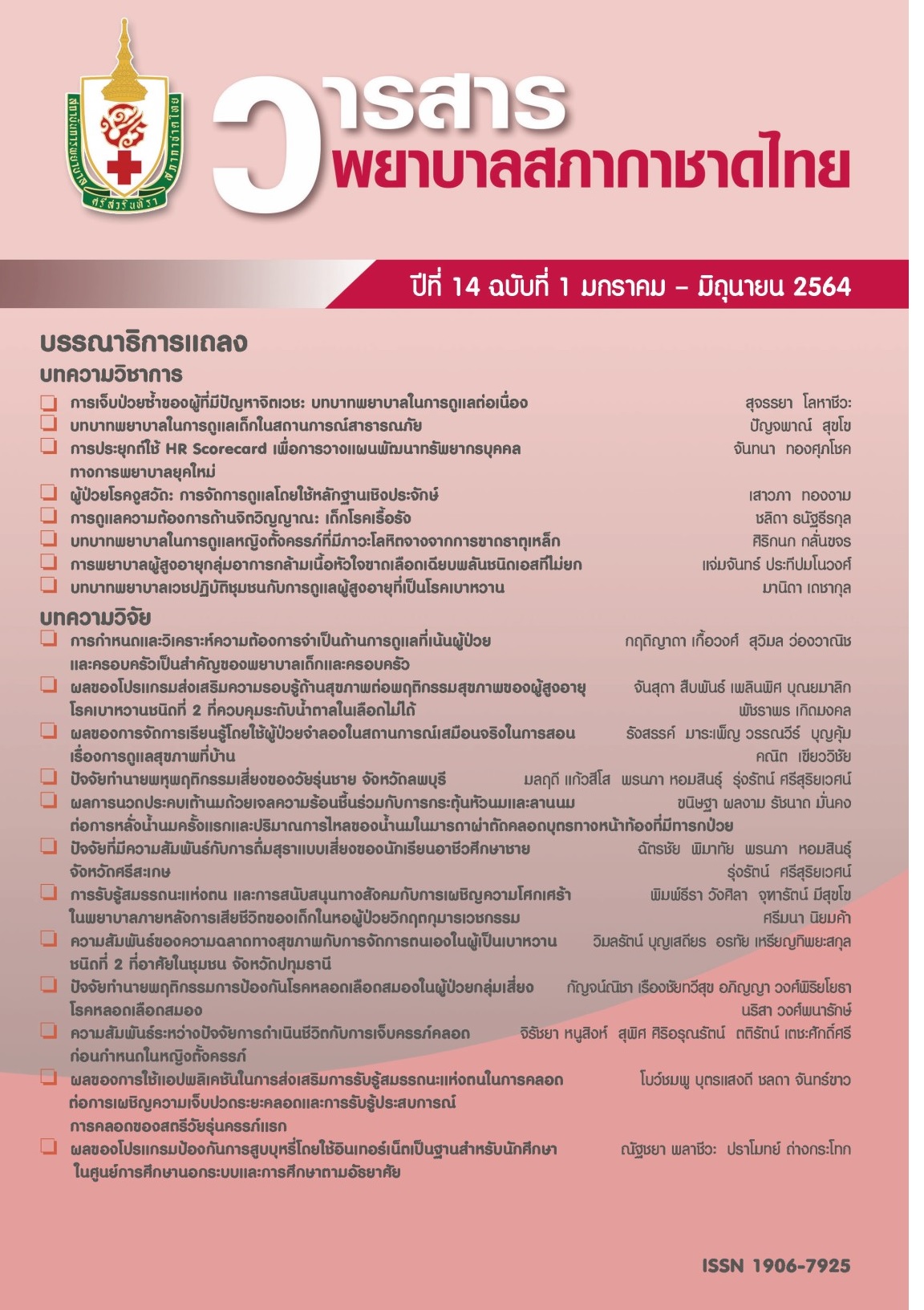Effects of a Health Literacy Promotion Program on Health Behaviors in Older Adults with Uncontrolled Type 2 Diabetes
Abstract
The purpose of this quasi-experimental research was to study the effects of a health literacy program on health behaviors; specifically, controlling blood sugar levels in the elderly with type 2 uncontrolled diabetes. The sample consisted of 60-69 year-olds, both male and female, who had been diagnosed with diabetes and had HbA1c ≥ 7% within the previous 6 months, or with fasting blood sugar levels (FBS) ≥ 130 mg/dl for 6-8 hours in 2 consecutive tests, and who receive treatment at 2 district health-promoting hospitals in Nonthaburi province. Two hospitals were purposively selected, one to act as the experimental group and one as the comparison group. Then, 30 study subjects who met the inclusion criteria were randomly selected from each hospital. The experimental group received a program to promote health literacy in relation to blood sugar control behaviors. The program consisted of four 90-minute sessions, carried out one time per week, and a 10-minute follow-up phone call in the 6th week. Data related to health behaviors for controlling blood sugar levels were collected by interview questionnaires in Weeks 1, 4, and 8, with content validity (CVI) measured at 0.85 and Cronbach’s alpha coefficient at 0.78. Data were analyzed using the Chi-square test, Fisher's Exact test, Repeated measure one-way ANOVA, Post-hoc Bonferroni, and Independent t-test.
The results revealed that, in the experimental group, the mean scores of health behaviors in the control of blood sugar levels after the experiment and the follow up period were higher than before the experiment, and with respect to the comparison group, with statistical significance (p-value < 0.05).
The study findings supported the effects of the program on health behaviors in the control of blood sugar levels and can be further applied to promote self-care in the elderly with type 2 diabetes.
References
2. World Health Organization. The top 10 causes of death (Fact sheet updated January 2017) [Internet]. 2017 [cited 2019 May1]; [ about 8 p.]. Available from: https://www.who.int/en/news-room/fact-sheets/detail/the-top-10-causes-of-death
3. American Diabetes Association. 2. Classification and diagnosis of diabetes: standards of medical care in diabetes-2019. Diabetes Care 2019;42(Suppl.1):S13-28.
4. Aekplakorn W, Mosuwan L, Ruangdaraganon N, Satheannoppakao W, Chanok H, Office of the Thai Population Health Survey 2014 [Internet]. 2018 [cited 2019 May1]. Available from: https://www.hsri.or.th/researcher/media/printed-matter/detail/9588 (in Thai)
5. Doungthipsirikul S. The 2013 Survey of the Elderly in Thailand under the Health Promotion Program of the Elderly and the Disabled. Health Intervention and Technology Assessment Program. Nonthaburee: Wacharin PP Printing; 2013. (in Thai)
6. Nonthaburi Provincial Public Health office. Action plan 2018 [Internet]. n.d. [cited 2019 May1] Available from: http://203.157.109.15/nont/ (in Thai)
7. Phol-uthai T, Banchonhutthakit P. Effects of self-care behavioral modification program for blood sugar control among elderly patients with type 2 diabetes mellitus: case study in Huai Keng Subdistrict, Kumpawapi District, Udonthani Province. Srinagarind Med J 2013;8(24):421-30. (in Thai)
8. Centers for Disease Control and Prevention. Improving health literacy for older adults: Expert panel report 2009 [Internet]. Atlanta: US Department of Health and Human Services; 2009 [cited 2019 May1]. Available from: https://www.cdc.gov/healthliteracy/pdf/olderadults-508.pdf
9. Baker DW, Wolf MS, Feinglass J, Thompson JA, Gazmararian JA, Huang J. Health literacy and mortality among elderly persons. Arch Intern Med 2007;167(14):1503-9.
10. Chesser AK, Woods NK, Smothers K, Rogers N. Health literacy and older adults: a systematic review. Gerontol Geriatr Med 2016;2:1-13.
11. Nutbeam D. Health literacy as a public health goal: a challenge for contemporary health education and communication strategies into the 21st century. Health Promot Int 2000;15(3):259-67.
12. Ishikawa H, Nomura K, Sato M, Yano E. Developing a measure of communicative and critical health literacy: a pilot study of Japanese office workers. Health Promot Int 2008;23(3):269-74.
13. Suksri S, Settheetham D. Health literacy and self care related to quality of life of elderly in Amnatcharoen Municipality Amnatcharoen Province. KKU Research Journal (Graduate Study). 2017;17(4):73-84. (in Thai)
14. Intabot K. The effect of a self-management and social support program on new hypertension cases with uncontrolled blood pressure. The Office of Disease Prevention and Control 9th
Nakhon Ratchasima Journal 2020;26(1):73-83.
15. Pannark P, Moolsart S, Kaewporm C. The effectiveness of a program for health literacy development of the patients with uncontrolled type 2 diabetes at Bangwua District, Chachoengsao Province. Nursing Journal of the Ministry of Public Health 2017;27(3):91-106.
16. Phol-uthai T, Banchonhutthakit P. Effects of self-care behavioral modification program for blood
sugar control among elderly patients with type 2 diabetes mellitus: case study in Huai Keng Subdistrict, Kumpawapi District, Udonthani Province. Srinagarind Med J 2013;28(4):421-30.
Downloads
Published
Issue
Section
License
เนื้อหาบทความหรือข้อคิดเห็นต่างๆ ในวารสารพยาบาลสภากาชาดไทยนี้ เป็นความคิดเห็นของผู้เขียนบทความ ไม่ใช่ความเห็นของกองบรรณาธิการ หรือสถาบันการพยาบาลศรีสวรินทิรา สภากาชาดไทย






